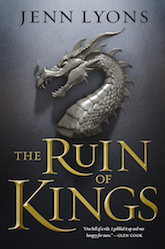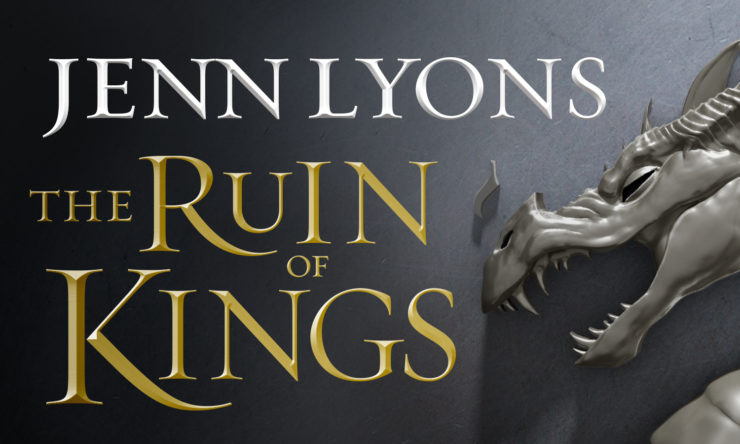Happy holidays, Tor.com! Would you like to celebrate with a discussion of demon prophecies and institutional slavery? Of course you would! So season appropriate, it’s amazing. So much so, in fact, that I have two chapters of it for you, yay!
This blog series will be covering the first 17 chapters of the forthcoming novel The Ruin of Kings, first of a five-book series by Jenn Lyons. Previous entries can be found here in the series index.
Today’s post will be covering Chapter 10, “Demon in the Streets”, and Chapter 11, “The Coming Storm”, which are available for your reading delectation right here.
Read it? Great! Then click on to find out what I thought!
Chapter 10
Well, that was disgusting and awful and adrenaline-producing in every freakin’ way, jeez. Demons are apparently no joke in this universe. I do not like them, Sam I am! Not even a little bit!
It does mostly answer my question about what happened after Kihrin stole the Slavery Necklace from Kazivar House—obviously he got away from the demon that time, though given how powerful it seems to be, I’m still not sure how he did it.
Naturally, though, the encounter with the demon this time, besides being hella gross, also raised more questions than it answered. Most importantly being what the heckity heck was all that about Kihrin being some kind of… prophesied demon king? Also the “Prince of Swords”? Also a hawk, I presume symbolically?
“Hail to the Lawbreaker; Hail to the Thief of Souls; Hail to the Prince of Swords. Long will we search for the lion, Until at last we find the hawk, Our king who will free us from ruin, The long suffering of our souls unlocked.”
Uh, what?
So, if Kihrin is the hawk, who is the lion? Have we met him or her yet? Why would Kihrin free demons from suffering? Or is it that he’ll free demons to suffer, the wording being unclear and demons being, you know, demons and (evidently) into that kind of thing? I don’t get at all why, seeing as Kihrin is most decidedly not into pain and suffering, based on his reaction to what the demon makes him experience. As torture goes, being made to experience yourself as a sadistic torturer is… well, that’s pretty horrific. Do Not Want.
Inquiring minds are… well, horrified, but also inquisitive af, y’all. I don’t know what any of this is about yet, but I think this is more or less a textbook example of The Plot, She Thickens.
It’s not enough that Kihrin’s secret human royalty, apparently. Some people just gotta be overachievers, man.
Kihrin scowled as he remembered his father’s taunt, that Ola spoiled him like a prince. Kihrin couldn’t be Ogenra. It wasn’t possible. He knew it wasn’t possible because he didn’t look Quuran, which meant he didn’t look like Quuran royalty either. He knew it wasn’t possible too because someone—a friend, or enemy of his ‘royal’ family—would have come looking for him.
I’m pretty sure we’ve been told at some earlier point what Quurans look like, but if so I can’t find it. Either way this is sort of confusing what with Morea’s assertion that he looked like he was a royal bastard. Maybe the royals are a different “type” than run of the mill Quurans? Is the royal family Quuran, in fact? Sometimes reading at this pace can confuse more than it illuminates.
I suspect this is not the last we’ve seen of General Qoran (the soldier who chats with the demon before driving him off) or his unnamed friend Patchwork Dude. I don’t think it bodes well for Kihrin’s anonymity that he now has the personal attention of someone as high up the social ladder as a general.
Lastly and most tangentially:
Surdyeh was quiet as they turned down Peddler’s Lane, a shortcut to Simillion’s Crossing where their patron Landril kept his penthouse and his mistresses.
The footnote notes:
Believed to be named because the road marks the spot where Simillion killed the god-king Gauras. In fact, it’s so-named because it marks the spot where the First Emperor’s murdered, mutilated corpse was put on display by the Court of Gems as an ‘object lesson’ to anyone who would defy them.
I am not nearly enough of a Tolkien nerd to know how much of a Tolkien reference this actually is, but I have suspicions. Anyone care to school me in the comments?
Chapter 11
One hundred and twenty-five years ago, the King of Zherias, Shogu, attempted to outlaw the practice of slaving, traditionally one of primary Zheriaso trade crafts (along with piracy and mercantilism). He survived less than five days past his declaration, and his eldest child, Sinka, promptly legalized it again.
Well, that’s depressing. All the more so for how unsurprising it is.
So this chapter is basically Teraeth lecturing Kihrin on how all Quurans suck because they practice slavery. And it’s not that I don’t agree with his rage over the situation, because it is definitely one of my least favorite institutions, but I can’t help but also agree with Kihrin that Teraeth is being awfully high and mighty for someone who currently, right this moment, owns a slave himself. And not just your average run of the mill slave, either, but a gaeshed slave, one who is enslaved not just in body but in soul, which is at least a hundred times worse. But I guess the ends justify the means, eh?
Buy the Book


The Ruin of Kings
Hypocrisy: It’s what’s for breakfast!
It’s kind of blindingly obvious by this point that slavery is a major theme and plot driver of Ruin of Kings, which is… interesting, from a personal standpoint. Those who may have followed my earlier blog series on Tor.com probably noticed that the concept of personal autonomy is kind of a very big deal to me. I was being a bit flippant above about slavery being not my favorite, but in fact I rather viscerally loathe its very existence, institutional or otherwise. Not that this makes me special or anything, but in terms of literary criticism, it was to the point where I too, like Teraeth, was inclined to condemn entire fictional cultures for it.
So, possibly, me calling Teraeth a hypocrite on this count is also hypocritical? I dunno. It’s worth pointing out, though, that I do not now own nor have I ever owned a slave, so maybe my hypocrisy is a tad less egregious than this guy’s.
Anyway, there is a whole potential (and controversial) discussion to be had here about whether all members of a culture should be held responsible for its overarching flaws/crimes/violations of the Geneva Convention, but I feel like that falls outside the purview of this blog post. That said, it’s pretty clearly a discussion that the novel itself is interested in having, so odds are we’ll be coming back to this subject at some point. Brace yourselves, y’all.
And here’s our stopping point—for today and for 2018! Have a lovely end-of-Gregorian-calendar-year season, in whatever way you choose to celebrate and/or ignore it, and come back and see me on January 8th for the next installment! Cheers!










